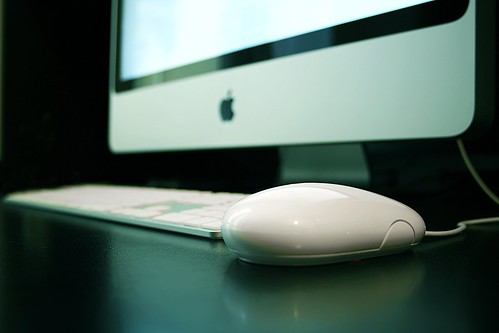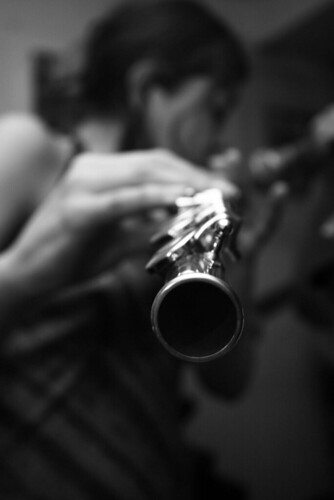Test your skills.

GarageBand listens to you play in real time and tells you how you’re doing. Watch the video
“How Did I Play?”
First GarageBand taught you how to play. Now it tests your chops. As you play along with any lesson, record yourself. GarageBand listens in real time and tells you how you’re doing. You’ll see how well you played with colored notes, a progress bar, and a performance meter. You can check your rhythm and note accuracy, keep track of your progress, and beat your best score — all while perfecting your skills.
Yesterday I launched a Google Form to collect essential skills and understandings for high school band students. Add your idea to the list:
https://spreadsheets.google.com/viewform?formkey=dFhTOW1qdl82TUZZS1hySjlFNUhG... Remember, your essential must be focused, teachable, and measurable. An essential learning makes other concepts or essentials possible, and moves the student one step closer to being a lifelong musician.Our district has adopted a model whereby we identify the things that each and every student will be able to know and do in a given course. These "essential learnings" provide the basis for lessons and summative/formative assessments. Ultimately the collection of essentials represents what it means to become a competent musician in the particular course. They provide the foundation for everything your performing ensembles well, perform. Essentials are very narrow. We don't say "every student will be able to play their band music." A realistic essential for a top high school ensemble might be: "Every student will be able to properly identify major key signatures and perform the associated major scales from memory."
It might seem very simple to identify these essentials, but when you start thinking of it in terms of every single student achieving mastery (not the typical bell curve of results), it can be challenging. I have put out feelers via Facebook and Twitter, but so far I have not found any other music programs who are in the midst of this process. So I am enlisting your help here on the blog, and hopefully a collaborative effort can result in something we all can use.
We are assembling "packets" for every instrument comprised of the skills that a (band/orchestra/choir) student should be able to do as a senior in a capstone music ensemble. One portion will be things that are written (key signatures, rhythm components) and the other portion will consist of performance demonstrations. The packets can provide a basis for ongoing assessments that can be used at multiple levels by altering the tempo requirements. We will also be able to use the packets as audition requirements for the following year. This will provide unprecedented continuity and spiraling in the course sequences. We are starting with the band packets and then moving to orchestra and choir from there.
What I'm asking is that you think of one skill/ability that a senior band student should be able to do, and leave it as a comment below. This will take you just a few seconds and everyone will benefit. I will share the first draft of the packets in the coming month. To get the process going, here is one that we came up with yesterday:
Every student will be able to play the melody to Chester in four-bar phrases (quarter note-based melody, not eighths) at quarter note=60 at a dynamic of mp with characteristic tone. This will demonstrate that the student has learned proper breathing technique while performing a lyrical line.
Or then again, will it? Do you see the challenges of describing these essential learnings? Remember, every student must be able to do it. If they can't, we must revise the instruction and the student stays with the essential learning until they have achieved it. Notice how changing the tempo would make this essential much easier, or much more difficult.
Considering things like range, articulation, key signatures, lip slurs, rudiments, and so on: Name an essential that you feel demonstrates what a senior should be able to know or do. Be sure to include a tempo and dynamic level, and the instrument (or instrument family). Keep the task focused, and set the bar where you think it should be. Thanks for your contributions.
I made this video to illustrate a situation that may resonate with you. Pat answers can give the impression that a concept is understood, but an attempt at some synthesis can reveal whether or not learning has taken place. Are you the "sender" or the "receiver" of this new move-in student?
Here is a brilliant talk given by Stanford University music professor Mark Applebaum that deals with the concept of improvisation. Great insight into the process, listener expectations, and more. This should be a required listen for every jazz educator and many students as well. Check out the Stanford podcast here (iTunes link).
 I was just watching a great documentary called Objectified (free if you have Netflix streaming). This is a fascinating look at the importance of good design, and if you appreciate design I highly recommend it.
I was just watching a great documentary called Objectified (free if you have Netflix streaming). This is a fascinating look at the importance of good design, and if you appreciate design I highly recommend it. At one point they interviewed Dieter Rams, former Design Director for Braun. He made these statements.
Good design should be innovative Good design should make a product useful Good design is aesthetic design Good design will make a product understandable Good design is honest Good design is unobtrusive Good design is long-lived Good design is consistent in every detail Good design is environmentally friendly Last but not least, good design is as little design as possibleHearing those maxims, there was something very familiar ringing true to my mind. Consider: Good teaching should be innovative Good teaching should make a concept useful Good teaching is aesthetic teaching Good teaching will make a concept understandable Good teaching is honest Good teaching is unobtrusive Good teaching is long-lived Good teaching is consistent in every detail Good teaching is environmentally friendly (think resources) Last but not least, good teaching is as little teaching as possible (think PBL)
I know it's pc to use the word learning almost to exclusion of the word teaching these days, but I think we need to remember that deep, meaningful learning is the result of innovative, honest, and consistent teaching....by design.
"25 Things About Music Teaching and Education" started a few years ago as a post on Facebook during the (short-lived) craze where everyone was posting 25 things about themselves. I moved the post here when I started this blog and have continued to refine it. Now, with Apple making it so easy to export ePub files from Pages, I thought I would make an eBook out of it. I hope you will enjoy reading it on your reading device of choice.
Download here: http://db.tt/U3ypKZY
